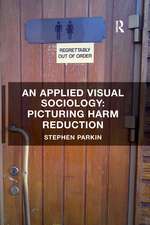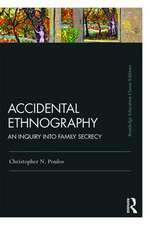Making Sense of Field Research: A Practical Guide for Information Designers
Autor Sheila Pontisen Limba Engleză Hardback – 23 iul 2018
Information design is recognized as the practice of making complex data and information understandable for a particular audience, but what’s often overlooked is the importance of understanding the audience themselves during the information design process. Rather than rely on intuition or assumptions, information designers need evidence gathered from real people about how they think, feel, and behave in order to inform the design of effective solutions. To do this, they need field research.
If you’re unsure about field research and how it might fit into a project, this book is for you. This text presents practical, easy-to-follow instructions for planning, designing, and conducting a field study, as well as guidance for making sense of field data and translating findings into action. The selection of established methods and techniques, drawn from social sciences, anthropology, and participatory design, is geared specifically toward information design problems. Over 80 illustrations and five real-world case studies bring key principles and methods of field research to life.
Whether you are designing a family of icons or a large-scale signage system, an instruction manual or an interactive data visualization, this book will guide you through the necessary steps to ensure you are meeting people’s needs.
| Toate formatele și edițiile | Preț | Express |
|---|---|---|
| Paperback (1) | 401.53 lei 3-5 săpt. | +21.47 lei 4-10 zile |
| Taylor & Francis – 23 iul 2018 | 401.53 lei 3-5 săpt. | +21.47 lei 4-10 zile |
| Hardback (1) | 1006.07 lei 6-8 săpt. | |
| Taylor & Francis – 23 iul 2018 | 1006.07 lei 6-8 săpt. |
Preț: 1006.07 lei
Preț vechi: 1226.91 lei
-18% Nou
Puncte Express: 1509
Preț estimativ în valută:
192.57€ • 209.25$ • 161.87£
192.57€ • 209.25$ • 161.87£
Carte tipărită la comandă
Livrare economică 21 aprilie-05 mai
Preluare comenzi: 021 569.72.76
Specificații
ISBN-13: 9780415790024
ISBN-10: 0415790026
Pagini: 274
Ilustrații: 180
Dimensiuni: 156 x 234 x 22 mm
Greutate: 0.62 kg
Ediția:1
Editura: Taylor & Francis
Colecția Routledge
Locul publicării:Oxford, United Kingdom
ISBN-10: 0415790026
Pagini: 274
Ilustrații: 180
Dimensiuni: 156 x 234 x 22 mm
Greutate: 0.62 kg
Ediția:1
Editura: Taylor & Francis
Colecția Routledge
Locul publicării:Oxford, United Kingdom
Public țintă
Postgraduate and ProfessionalCuprins
Figures Tables Preface Acknowledgements PART I: Two Practices, One Journey What is information design? Information design challenges The role of people in information design New roles, new needs, new skills Emerging role: information design researchers 2. Bridging information design and field research Understanding people-centred research in design Understanding qualitative research Why clients (and designers) don’t trust qualitative research Working with field research: the information design process revised When to conduct field research in information design 3. What is field research? Understanding key components Considerations for conducting field research in information design How to develop a field research sensibility How to ensure quality and validity in field research How to work around constraints Thinking creatively in field research Use information design in the research process PART II: Conducting a Field Study 4. How to plan and design a field study Design the study Assemble the team Put the pieces of the study together Test the design study Going into the field Checklist 5. Gathering data: methods for exploratory studies Observational studies Contextual interviews Contextual inquiry Design probes and diary studies Collaborative workshops Online field research 6. Gathering data: methods for evaluation studies Information design evaluation dimensions Assessing a design at various stages of development Assessing a design with field evaluations Concept evaluations Covert evaluations Overt evaluations Free evaluations 7. Making sense of field data Understanding sensemaking Sensemaking step-by-step Tools supporting analysis Methods for organizing and coding data Five Ws + one H Visual content analysis Affinity diagrams Empathy maps Methods for supporting data interpretation Needfinding Personas Visualizations PART III: Communicating Findings 8. Reporting field research findings Dimensions for communicating findings Creating authentic stories How to share the whole study How to share key parts of the study 9. Bridging to design: from findings to actionable design decisions Understand findings Make findings tangible From ideas to design concepts Support the information design process 10. Putting it all together PART IV: Case Studies 11. Field research in information design practice Case Study 1: The Redesign of the Carnegie Library of Pittsburgh Case Study 2: Legible London Case Study 3: Vendor Power Guide Case Study 4: A Better A&E Case Study 5: To Park or Not to Park
Notă biografică
Sheila Pontis is an information designer bridging theory and practice. She is currently Honorary Research Associate at University College London, UK, a lecturer at Princeton University, USA, teaching creativity, design thinking, and information design, and partner at Sense Information Design, a New York-area design consultancy.
Descriere
Learn how to use field research to bring essential people-centred insights to your information design projects.
If you’re unsure about field research and how it might fit into a project, this book is for you. This text presents practical, easy- to-follow instructions for planning, designing, and conducting a field study, as well as guidance for making sense of field data and translating findings into action. Over 80 illustrations and 5 real-world case studies bring key principles and methods of field research to life.
Whether you are designing a family of icons or a large-scale signage system, an instruction manual or an interactive data visualization, this book will guide you through the necessary steps to ensure you are meeting people’s needs.
If you’re unsure about field research and how it might fit into a project, this book is for you. This text presents practical, easy- to-follow instructions for planning, designing, and conducting a field study, as well as guidance for making sense of field data and translating findings into action. Over 80 illustrations and 5 real-world case studies bring key principles and methods of field research to life.
Whether you are designing a family of icons or a large-scale signage system, an instruction manual or an interactive data visualization, this book will guide you through the necessary steps to ensure you are meeting people’s needs.




















